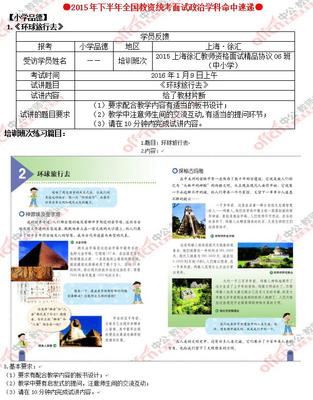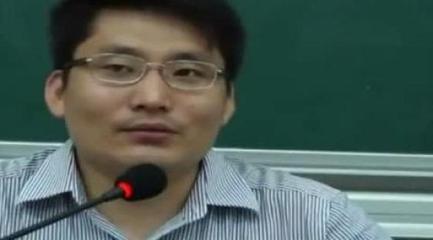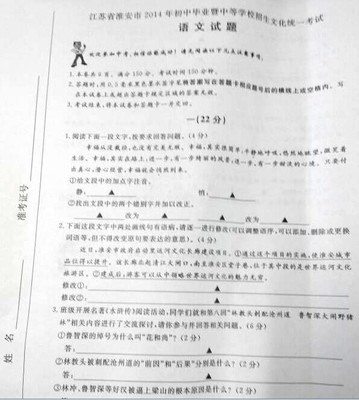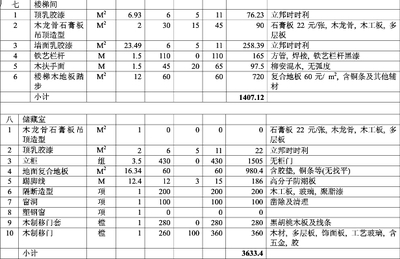第四部分外语运用能力测试(英语)
(50题,每题2分,满分100分,考试时间45分钟)
Part One Vocabulary andStructure
Directions: There are ten incomplete sentences inthis part. For each sentence there are four choices marked A, B, Cand D. Choose the one that best completes the sentence. Mark youranswer on the ANSWER SHEET with a single line through thecenter.
1. We interview ten_______but did not find anyonesuitable.
A. candidates B.partners C. companions D.opponents
2. The customs officer_______him open his threesuitcases.
A. urged B.asked C. made D.forced
3. We all questioned_______accurate the resultwas.
A. what B.how C. why D.however
4. It wouldn’t do you any _______to work a bitharder.
A. hurt B.harm C. injury D.wound
5. I need new heels on these shoes; the presentones are _______.
A. taken down B.kept down C. knocked down D.worn down
6. This instrument, _______and operating nextyear, will consist of
A. completing B.completed C. to be completed D.to complete
7. She lost her balance and if she hadn’tsupported herself.
A. would have fallen B.fell C. would fall D.had fallen
8. The radical policy was rejected a more cautiousone.
A. in favor ofB. inspite of C. in time of D.in honor of
9. I can’t tell you how I am to you for havinglistened to me.
A. useful B.helpful C. faithful D.grateful
10. Bats are long-lived creatures, alife-expectancy of around 20 years.
A. some have B.some having
C. some of which having D.some of them have
Part Two ReadingComprehension
Directions: In this part there are three passagesand one table, each followed by five questions or unfinishedstatements. For each of them, there are four choices marked A, B, Cand D. Choose the best one and mark your answer on the ANSWER SHEETwith a single line through the center.
Questions 11-15 are based on the followingpassage:
Passage One
Many people start relationships because ofloneliness. Loneliness and being alone are not synonymous.Loneliness is a state of painful isolation, of feeling cut off fromfriends and family. Being alone, a state of solitude(独处), can be quite desirable most of thetime, since it allows us to work, study, live, or reflect on theworld around us. Solitude is usually a matter of choice; lonelinessis not.
Lonely people tend to spend a lot of time bythemselves, eat dinner alone, spend weekends alone, and participatein few if only any social activities. They are unlikely to date.Some lonely people report having many friends, but a closer looksuggests that these “friendships” are shallow. Lonely people areunlikely to share confidences. Loneliness tends to peak duringadolescence (青春期). This is when most young peoplebegin to replace family ties with peer relationships. Loneliness isquite often connected with feeling of depression and with a feelingof being “sick at heart”.
Loneliness is even reported among some marriedpeople. In one of the recent studies, lonely wives tended to feelless liking and love for their partners and expressed lesssatisfaction with their married life. Lonely husbands reported lessliking for their wives and less intimacy in theirrelationship.
11. The topic of the first paragraph is.
A. isolation and pain
B. solitude and loneliness
C. how to begin relationships
D. intentional choice of staying alone
12. The word “synonymous” (Para.1) is closest inmeaning to .
A. similar B. relevant C. different D.unknown
13. Which of the following is discussed inParagraph 2?
A. How loneliness usually gets started.
B. Why lonely people often feeldepressed.
C. What lonely people want in general.
D. How lonely people usually behave.
14. According to Paragraph 2, adolescence is aperiod in life when .
A. teenagers begin to form a closer tie withpeers
B. young people become less disciplined
C. young people break their family ties
D. most teenagers feel lonely anddepressed
15. According to a recent study, loneliness.
A. is often found among adults
B. bring unpleasant effects to marriage
C. is a matter of personal choice
D. bring a closer family relationship
Questions 16-20 are based on the followingpassage:
Passage Two
Now, one biggest summertime question has beenanswered: Why do people look so much better in sunglasses? VanessaBrown, a senior lecturer of art and design at Nottingham TrentUniversity, gave an inside look into the connection between shadesand sex appeal.
According to Brown, sunglasses do a wide varietyof positive things. They make up for any asymmetries(不对称), which relates directly to researchproving that symmetrical faces are the most attractive ones. If youput on a pair of sunglasses, the lenses will instantly create aperfectly symmetrical face. Sunglasses also create the appearanceof a defined bone structure on top of a relatively soft face.Additionally, people often form quick judgments about others bylooking into their eyes. Through eye contact, we can determinesomeone’s confidence, sincerity and intelligence. If those eyes areshielded, though a person is automatically unreadable.
We take them for granted today, but sunglasses area relatively modern everyday accessory (饰件). Sales started to pick up in the1920s, but they didn’t become commonplace until about two decadesafter that. In their early days sunglasses were primarily usedduring risky water and snow sports, and were also associated withnew technologies like airplane travel, which made them seem “daringand thoroughly modern”.
Later, Hollywood stars of the 1950s and 60sstarted wearing sunglasses to defend themselves from beingrecognized by the public or harassed by paparazzi(狗仔队). Movie stars’ adoption of theaccessory strengthened the link between sunglasses andappeal.
16. Sunglass makes us look appearing by_____.
A. covering our tiredness
B. creating a softer face
C. protecting our eyes
D. improving our facial appearance
17. According to Paragraph 3, people in sunglasseswould look_____.
A. smart B. mysterious C. proud D.confident
18. Sunglasses began to be popular inthe______.
A. 1920s B. 1940s C. 1950s D. 1960s
19. The example of sportsman showsthat______.
A. they over-emphasized the role ofsunglasses
B. the public are eager to follow them
C. sunglasses create a desirable image
D. sunglasses protect people fromharassment
20. The passage is mainly writtento______.
A. explain why sunglasses improveappearance
B. demonstrate how to make better use ofsunglasses
C. introduce the major functions ofsunglasses
D. describe the evolution of sunglasses
Questions 21-25 are based on the followingpassage:
Passage Three
A cup of tea is almost a symbol of Britishculture. As a nation, we are well known for our strong liking forthis particular hot drink, especially if it is accompanied by somecake or biscuits. Here are some facts about tea drinking habits inthe UK.
1)There is no real tea time
All around the world, everyone thinks that Britishpeople drink tea every day at 5 o’clock in the afternoon. Inreality, we drink tea at every hour of the day, from the minute weget up to the last thing before going to bed. Of course it’s quitelikely that a British person will drink tea around the middle ofthe afternoon, but it’s also common to drink it withbreakfast.
2) The perfect partner : scones
Scones are a simple kind of cake, slightly sweetand usually served with jam and cream. They are excellent with tea.In fact, if you order a “cream tea” in the UK, you’ll get a teapotaccompanied by a plateful of these little treats.Delicious!
3) Milk in tea
British people nearly always put milk in theirtea. This seems strange to people from other European countries,who would rather drink their tea without adding anything to it. InBritish, people add a certain quantity of milk depending on tasteand the tea ends up being opaque (不透明) and brown instead of clear. Peopleare always shocked when I say that I prefer coffee to tea. Teareally is part of our cultural identity, whether we like it ornot!
21. According to the passage, British people arewell known for .
A. their unique cake and biscuits
B. Their particular drinking habits
C. their passion for tea
D. the love of their own culture
22. People tend to believe that British tea timeis .
A. at any time of the day
B. at breakfast time
C. before going to bed
D. late in the afternoon
23. A typical “cream tea” in the UK .
A. usually goes with scones
B. is a special kind of cake
C. is a slightly sweet drink
D. includes a teapot as a gift
24. According to the passage, people from otherEuropean countries .
A. take tea as their culture identity
B. prefer cream tea to coffee
C. seldom add anything to their tea
D. like to add milk to their tea
25. What is this passage mainly about?
A. British tea history. B. British eatinghabits.
C. British tea time. D. British teaculture.
Questions 26-30 are based on the followingchart:
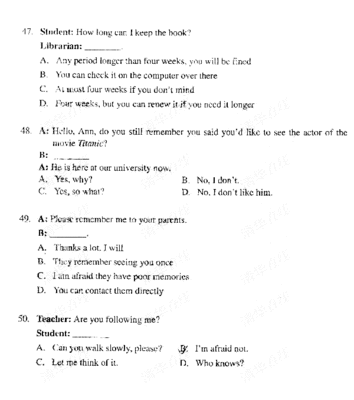
26. What can be said as an overview of thechart?
A. There has been little population change overdecades.
B. The aged population will continue togrow.
C. Most American can live longer in 2020 thantoday.
D. The growth rate of aged people is slowingdown.
27. What was true of the situation in2000?
A. The total number of aged people haddropped.
B. The total number of aged people remainedunchanged.
C. The number of people aged 65-74 hadgrown.
D. The number of people aged 75-84 hadincreased.
28. From 1980 to 2010, which age group had thehighest growth rate?
A. Aged 65-74. B. Aged 75-84. C. Aged over 85. D.Aged under 65.
29. What was the total aged population in2010?
A. 30 million. B. 40 million. C. 33 million. D. 45million.
30. Which decade sees the sharpest increase inpopulation between 65-74?
A. 1980s. B. 2000s. C. 1990s D. 2010s.
Part Three ClozeDirections:
There are ten blanks in the following passage. Foreach numbered blank, there are four choices marked A, B, C and D.Choose the best one and mark your answer on the ANSWER SHEET with asingle line through the center.
Imagine a product that can be used as medicine, acleaning agent, and a beauty treatment. You can eat it, drink itsjuice, and 31 essential oil from it. It is available all over theworld, and is inexpensive. You may even have one in your kitchen 32. What is it? The lemon!
It is thought that lemons 33 in Southeast Asia.From 34 they were gradually carried westward, toward theMediterranean. Lemon trees thrive in mild 35 , which is why theygrow so well in places like Italy, Mexico, Spain, and even parts ofAfrica and Asia. A mature tree, depending on the variety andlocation, can produce 36 from 200 to a staggering 1,500 lemons ayear. The cultivated varieties 37 in different periods, making itpossible to harvest lemons year-round.
You don’t need lots of space to grow a lemon tree.Even a sunny balcony (阳台) is enough, 38 small lemon trees canbe grown in pots and can make your house beautiful. They likesunny, wind-free spots where they can soak up the warmth, 39against a wall. However, if the temperature drops a lot during thewinter, they need to be 40 or brought indoors.
31. A. occupy B. examine C. obtain D.exchange
32. A. right now B.on time C.in time D.just now
33. A. rootedB. emergedC.appeared D.originated
34. A. where B.which C.when D.there
35. A. weather B.climates C.land D.soil
36. A. anywhere B.elsewhere C. everywhere D.nowhere
37. A. sow B.plant C.harvest D.bloom
38. A. when B.whileC. asD.though
39. A. likely B.preferably C. probablyD.literally
40. A. covered B.closed C.buried D.packed
Part Four DialogueCompletion
Directions: In this part, there are ten shortincomplete dialogues between two speakers, each followed by fourchoices marked A, B, C and D. Choose the one that mostappropriately suits the conversational context and the bestcompletes the dialogue. Mark your answer on the ANSWER SHEET with asingle line through the center.
41. A: I ordered a book from you last Saturday. Ithasn’t arrived yet.
B: Please tell me the serial number on your ordersheet. .
A. You won’t regret it B.Trust me
C. I promise D.I’ll run a check for you
42. A: You seem to be having someproblem.
B:.I’llmanage.
A. Are you sure? B.I’m afraid not.
C. It’s all right. D.Is it so?
43. A: Well, you told me to soak it in hotwater.
B:.Itold you to dip it in warm water.
A. You did, you know. B.No, I didn’t!
C. That’s what I said!D. That’strue.
44. A: I don’t know what we’d have done if youhadn’t come along.
B:.It was the least I could do.
A. It’s very good B.It works well
C. Don’t mention it D.I’m not sure
45. A: Excuse me, sir, but could I ask you a quickquestion?
B:.
A. Sure, What is it? B.Yes, you are so kind.
C. Take it easy. D.Give me a break.
46. A: We have to say bye now. I wish you apleasant journey.
B:.
A. You can count on me. B.Thanks. Take care.
C. The same here. D.Yes, you said it.
47. A: It must feel great to be almost finishedwith school. At least you can see the light at the end of thetunnel.
B:.
A. That goes without saying. B.Who can tell?
C. You can say it again. D.That’s not saying much.
48. A: A button came off my shirt and waslost.
B: Many shirts come with an extrabutton.
A: You’re right..
A. Let’s see if it has one. B.I’ll sew it on.
C. Forget it! D.That’s a good idea.
49. A: Something must be wrong with my computer.All I get is a black screen.
B: Will you lose all your files?
A:.
A. It sure is, but I’ll call the serviceB.I won’t let it go
C. No, I always back up my files D.I’ll do my best
50. A: I can’t believe it’s so hot. I think I’mdying from the heat. It’s not even noon yet.
B: _______
A. That means it will get even hotter?B.I’m sure I will die from it.
C. Will you please turn on the air conditioner?D.What will happen then?
推荐:2014年GCT考试语文数学逻辑英语真题答案解析汇总
 爱华网
爱华网